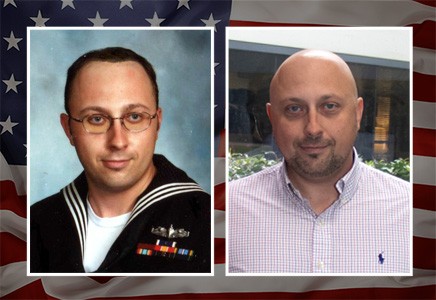Randy Michaud served as a Nuclear Machinist's Mate while in the Navy. Randy served from 1996 to 2002. He started his career at Jefferson Lab in 2003 and is now the Deputy of Accelerator Operability.
"In my small community, service to your country was very highly regarded and encouraged."
Q&A with Randy Michaud, Navy
What did you do for the military?
I was part of the Navy's nuclear power program and trained as a Nuclear Machinist's Mate. I was responsible for operating and maintaining the mechanical systems for the nuclear power plants that power nuclear submarines and aircraft carriers. Specifically, I specialized in reactor mechanical systems associate with the Nimitz-class aircraft carrier propulsion plants.
What made you decide to join the military?
I come from a military family. My grandfather was in the Navy, my father was in the Army, and my brother was in the Air Force. Out of high school I was looking for opportunity, education, and adventure. I felt that joining the military offered the jump start I needed in life to escape a small town in northern Maine. In my small community, service to your country was very highly regarded and encouraged.
Why did you choose the branch of service that you did?
I had knowledge of all branches, however my grandfather talked most about his WWII Navy service. I scored very high on the ASVAB military entrance exam, which qualified me to test for the Navy Nuclear Program. The nature of the selection process, the reputation of the program, taking on the challenge and the potential reward for "making it" - there really wasn't a decision...I had to prove to myself that I could do it.
What was your favorite part of the job?
I would have to say the camaraderie. The job was tough. Even in the toughest times, no matter what, we were a team and had each other's back. We really were a family and bonded by the experiences we faced.
What was your most interesting/favorite deployment or duty station and why?
For most of my time in the Navy, I was stationed aboard the aircraft carrier USS George Washington. We spent a lot of time at sea, conducting various exercises and deployments. There were many significant events that we were a part of, but one of the most significant was our efforts following the Sept. 11, 2001 terrorist attacks. We were at sea conducting testing off the coast of Virginia when the attacks occurred. We raced to New York harbor arriving on Sept. 12 to provide rescue support and cover. The ship's propulsion plants were pushed to their limits; this was real and all of our training and experience was put to the test. Not my favorite or most interesting mission, but one where I felt the most sense of purpose. During a time when our country needed us most, the team I was a part of was able to deliver some sense of security.
What skills did you develop that you use now after your military career?
There are many skills that I use today that were developed during my time in the military. Technical skills, troubleshooting, and attention to detail top the list. Some of the softer skills/experiences are communication, exposure to different cultures, diversity, acceptance, ownership and accountability, and decision making. Finally, leadership and empathy are two big ones - understanding how to lead teams. Understanding that people are motivated by different things; being a leader is about understanding people, their situations, having empathy and relating to them...and developing trust.
The regional home of Jefferson Lab, Hampton Roads, has a rich military history. Located in Southeastern Virginia, the region is currently home to more than 80,000 men and women in uniform, representing every branch of the armed forces. Throughout November 2019, Jefferson Lab is celebrating the region's military ties by highlighting some of our veteran employees who have served in the armed forces and who continue to serve their nation by supporting the research efforts carried out at the laboratory.


